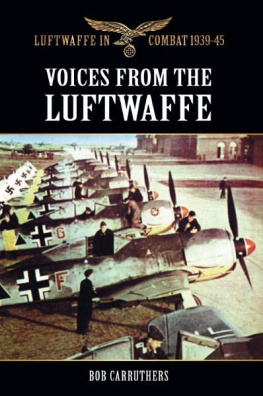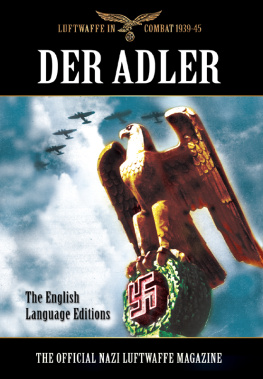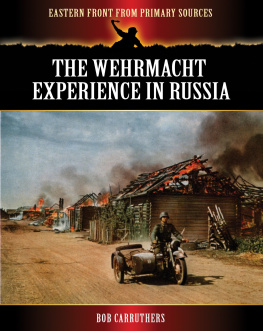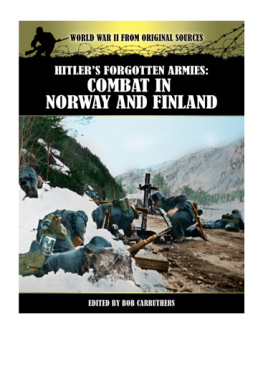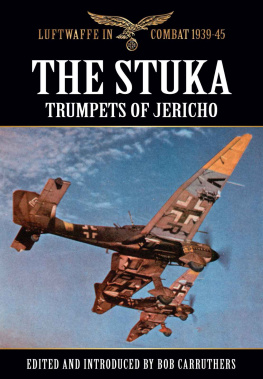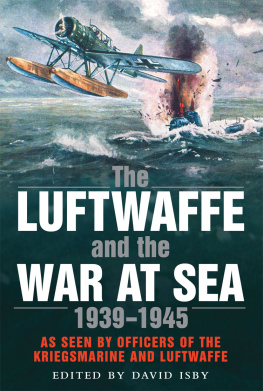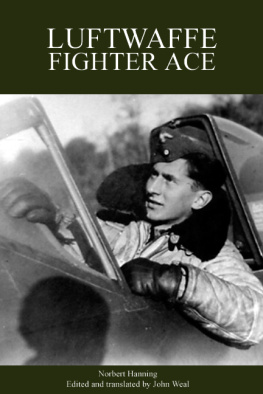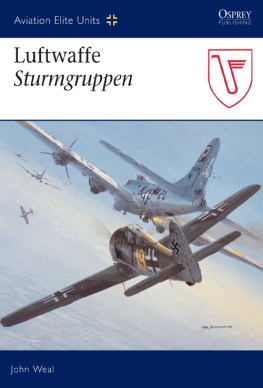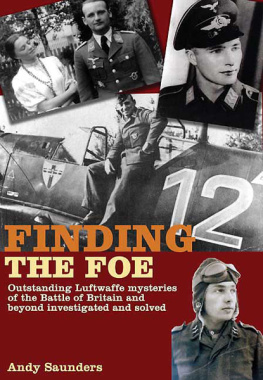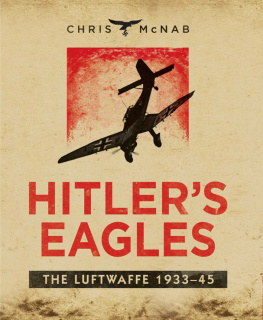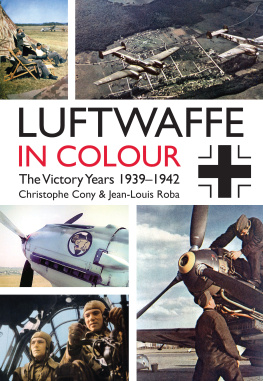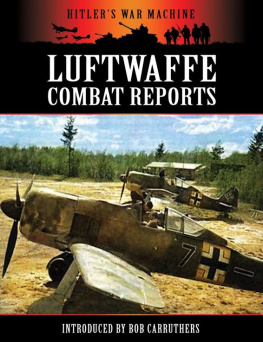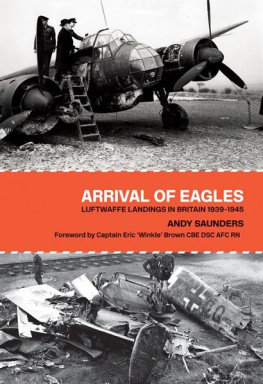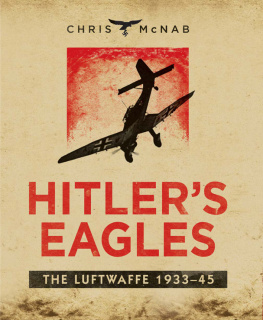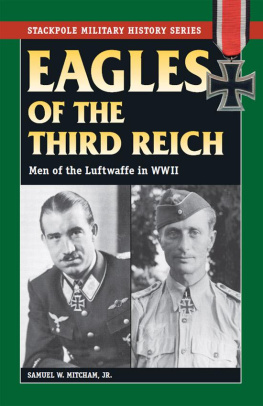
This edition published in 2012 by
Pen & Sword Aviation
An imprint of
Pen & Sword Books Ltd
47 Church Street
Barnsley
South Yorkshire
S70 2AS
First published in Great Britain in 2011 in digital format by
Coda Books Ltd.
Copyright Coda Books Ltd, 2011
Published under licence by Pen & Sword Books Ltd.
ISBN: 978 1 78159 111 6
EPUB ISBN: 978 1 47384 445 2
PRC ISBN: 978 1 47384 452 0
The moral right of Bob Carruthers to be identified as the author of this work has been asserted in
accordance with the Copyright, Designs and Patents Act, 1988.
A CIP catalogue record for this book is
available from the British Library
All rights reserved. No part of this book may be reproduced or transmitted in any form or by any
means, electronic or mechanical including photocopying, recording or by any information storage
and retrieval system, without permission from the Publisher in writing.
Printed and bound in India
By Replika Press Pvt. Ltd.
Pen & Sword Books Ltd incorporates the Imprints of Pen & Sword Aviation, Pen & Sword
Family History, Pen & Sword Maritime, Pen & Sword Military, Pen & Sword Discovery, Pen &
Sword Politics, Pen & Sword Atlas, Pen & Sword Archaeology, Wharncliffe Local History,
Wharncliffe True Crime, Wharncliffe Transport, Pen & Sword Select, Pen & Sword Military
Classics, Leo Cooper, The Praetorian Press, Claymore Press, Remember When, Seaforth
Publishing and Frontline Publishing
For a complete list of Pen & Sword titles please contact
PEN & SWORD BOOKS LIMITED
47 Church Street, Barnsley, South Yorkshire, S70 2AS, England
E-mail:
Website: www.pen-and-sword.co.uk
CONTENTS

From his office at Rostock-Marienehe Dr. Heinkel watched his works pilots trying out their new machines. A field-glass is always handy, so that he can follow their trial flights.

Karl Born, Luftwaffe pilot. The Russian air force was very bad. They hurled all sorts of stuff down, stones, bits of iron. It was all very primitive.

Alfred Wagner, Luftwaffe fighter pilot. I volunteered for the Luftwaffe when I was 17. To me, it was a marvellous adventure. If we were asked to volunteer to fly somewhere, I was always first in the queue!

The famous Stuka dive bomber has become synonymous with the Wehrmacht of the Blitzkrieg era. The unique gull wing configuration made the sinister shape this dive bomber readily distinguishable. However the cumbersome non-retractable landing gear contributed to the very slow air speed rendered the Stuka highly vulnerable to Allied fighters. This glaring drawback was cruelly demonstrated in the Battle of Britain where the losses were so high that the aircraft had to be withdrawn from frontline service.
INTRODUCTION TO THE WEHRMACHT INTERVIEWS
F or most people alive at the time, the Second World War is a distant, if painful, memory. For very many more, it is just history, something that happened before they were born and made no impact on their lives or their recollections. However, for those who served and survived, the recollections are as vivid as they were at the time they occurred and nearly sixty years on, they remain vivid down to the last fine detail.
Until recently, the picture has been somewhat incomplete. The generals and politicians have written their memoirs, the regimental histories have found their way into print, some of the participants have set down their experiences, the films, the videos, the documentaries have been made. It is, however, the victors who write history, and the Second World War has been no exception. Now, a group German veterans who have kept silent for nearly sixty years have come forward with accounts of their own war.
In their youth, they served the Third Reich and their Fhrer for the six years the War lasted and came away with impressions and memories of the conflict from the sharpest of sharp ends - the early halcyon days of the blitzkrieg, the hazards and rigours of the Russian campaign, the discomforts of the U-boat war, the war in the air and the last days of Berlin in 1945 as the thousand-year Reich went down in the blood, flames and destruction of total ruin.
The Third Reich had many faces, and the German veterans who tell their stories in this book came to the Second World War from different and sometimes surprising perspectives. For instance, Detlef Radbruch, who fought with the Luftwaffe, had little time for Hitler and actually came from an anti-Nazi family, but as a soldier, he still believes, you have to do your duty. Hanno Rittau, who served in a Luftwaffe anti-aircraft unit, says much the same thing: We had to defend out home and we had to defend our country, and thats what we tried to do.
Heinz Reiners joined the Kriegsmarine because his father had served in the German Navy during the First World War.
So his son had to do the same in the Second! But it wasnt just that. We were young, we were enthusiastic. The propaganda we heard told us that only the Germans were worth anything, all the others were nothing. Thats the way we were brought up in our youth.
For Karl Born, a volunteer who joined the Luftwaffe, his war service was a natural continuation of his training as a glider pilot, which began when he was only thirteen, in 1936.
At that time, the first flying groups had been set up in the Hitler Youth. We were supervised by the German Air Sport Association which had been founded after the First World War by former airmen. They had been forced to switch to gliders because Germany wasnt allowed to build planes with engines any more. I took various glider pilot exams in this Hitler Youth Flying group and after that the air pilot license for gliders, which permitted me to fly gliders loaded with up to ten people.
Karl Born found it all a great adventure, though his sense of adventure was afterwards tempered by his war experiences.
I volunteered when I was seventeen and when I was twenty, in 1941, I went on my first mission. Flying was enormous fun, and I was full of enthusiasm for it. If we were asked to flying somewhere, anywhere, I always volunteered straight away. Of course, it was a good feeling to survive aerial battles, but in retrospect, later, when you reviewed it all, you had to say that it was all madness. The war, every war, shooting at men youd never seen beforeI must say that today, I wouldnt want to volunteer.
Wolfgang Reinhardt was another volunteer for whom the War was just an extension of peace-time activity. Reinhardt belonged first to the Jungvolk, afterwards to the Hitler Youth, and that meant that between the ages of six and sixteen, when he volunteered, he was preparing for war and knew little else.
I was a recruit in the Army NCO school, Potsdam-Reiche, the lite school in Germany. Whoever went through its doors could be proud to have been there, you could walk 3 centimetres taller. All the training was geared to war. We were trained on mortars and machine guns; and made mock attacks on bunkers, although it wasnt all that much of a pretence because live rounds and shells were used. The training was tough. We had to face all the dangers of real battle, and its discomforts, too.
Next page
